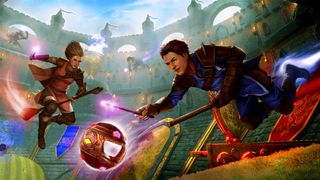Broomstick League proves I won't be going to Hogwarts on a Quidditch scholarship
It's Rocket League but with broom-riding witches instead of cars.

There's this thing that happens to me when I play Rocket League, where the ball and the crowd of other cars are on one side of the map and I'm on the other. And no matter what I do in my rocket car, that situation remains the same. If I play as a forward and chase the ball it's always being knocked away from me just as I reach it. If I hang back to tend goal long minutes seem to pass with all the action happening down at the other end—until I get impatient and go chasing, at which point it sails past me and toward the goal I've been guarding until just that very moment.
So I felt quite at home in the Broomstick League beta, which is basically Quidditch from Harry Potter or Rocket League with witches. Teams chase a big ball while flying around an arena and casting spells, trying to score a goal that results in an explosion that sends players pinwheeling through the air. And me, I'm always floating around in a spot where none of that is happening.
In Broomstick League, you don't ram the ball like you do in Rocket League. You're a wizard flying around on a broomstick, so you can actually pull the ball toward you with a magnetism spell—though that ability seemed to work far better in the tutorial than it did in the actual arena, where it sometimes seemed to have little or no effect. And rather than bumping the ball in front of you, you actually carry it with you, attempting to blast it (again, with magic) into a teammates hands or into the opponent's goal.
But as small as the arena is, carrying the ball to the goal isn't easy. If a witch from the other team is close enough and their aim is good enough, they can cast a blast spell, knocking the ball from your hands or deflecting your shot or pass. Getting in close is the key: I tried using my blast spell on enemy ball carriers with very little success, though I had it done to me just before I took a shot on goal and it definitely worked. You just need to be right on your opponent's tail when you do it.
Players can also blink—project an image of themselves a short distance across the arena and then teleport to it. For really quick movement, though, it's better to use a mana-draining speed boost or employ gravity: head to the top of the arena and come nosediving in from above, which lets you build up a lot of extra speed.
Teamwork is key, which I guess shouldn't be surprising. In the matches I played, I saw witches on the other team making multiple passes to each other on their scoring drives, yet no one on my team of randoms ever passed the ball to me (and thus I developed a childish grudge and never passed to them).
The biggest issue was that during the beta there just weren't all that many servers to play on, and many matches were either populated by bots, who I have to acknowledge are excellent at Broomstick League, or by teams who clearly were working together and thus handily dominated my own team of strangers.
The biggest gaming news, reviews and hardware deals
Keep up to date with the most important stories and the best deals, as picked by the PC Gamer team.
But getting repeatedly trounced wasn't really the problem. The flying is fun enough, but Broomstick League needs something to give it it's own identity. We've already got a game for people who like Rocket League: it's called Rocket League, and it's great (except perhaps for Mac and Linux users). And despite the trappings, Broomstick League doesn't really make me feel like I'm Harry Potter. The magic spells aren't impressive or fun enough to feel really magical. I'm not quite sure what Broomstick League is missing, but there's a hook that just isn't there.
We'll see how Broomstick League does in Early Access, where it'll arrive next month. Hopefully during its time in there it'll be able to conjure up an identity of its own.

Chris started playing PC games in the 1980s, started writing about them in the early 2000s, and (finally) started getting paid to write about them in the late 2000s. Following a few years as a regular freelancer, PC Gamer hired him in 2014, probably so he'd stop emailing them asking for more work. Chris has a love-hate relationship with survival games and an unhealthy fascination with the inner lives of NPCs. He's also a fan of offbeat simulation games, mods, and ignoring storylines in RPGs so he can make up his own.
Most Popular


